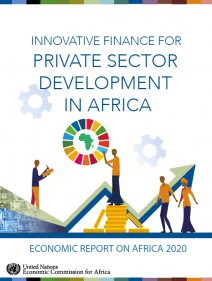FRONT MATTER
ERA Spark Page
Africa today, in the wake of COVID-19, is facing an unprecedented threat to its hard-earned growth over the last decade. The pandemic is global, but the resilience of the African region depends on the strategies and policies countries adopt now, building on recent initiatives to accelerate economic growth to meet national development aspirations in line with the Sustainable Development Goals (SDGs) and the African Union’s Agenda 2063, and to do so in a financially and environmentally sustainable manner.
The cost to achieve the SDGs by 2030 in Africa is estimated at about $1.3 trillion a year, according to the United Nations. It will increase dramatically due to population growth projected at 45 per cent over 2020–2030—a dynamic that could seriously undermine the efforts to end extreme poverty and inequality, tackle climate change and build resilient infrastructure in Africa.
Increasing the role of the private sector stands out among the widely advocated options for such investments, especially given the low levels of investment by governments and the donor community. This option resonates with African Continental Free Trade Area (AfCFTA) initiatives to harness the demographic dividend, grow the middle class, increase the use of technology, promote rapid urbanization and boost opportunities for regional and global value chains for African businesses as strategic drivers of economic growth in Africa. And the continent is endowed with a strong natural resource base, abundant human capital and, most important, strong entrepreneurial activity among its people, features that together signpost the road to private sector development.
For a more interactive experience, click on the ERA Spark Page here









